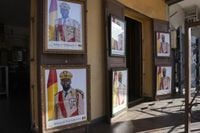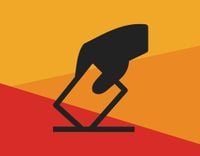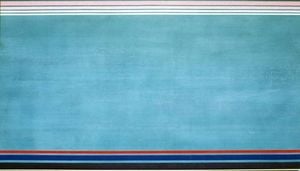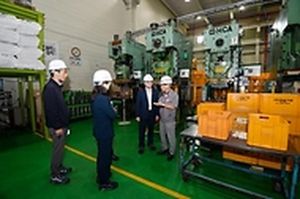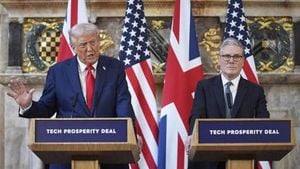Guinea’s capital, Conakry, was awash in color and commotion as the sun set on Thursday, September 18, 2025. The streets pulsed with the rhythms of reggae concerts, Quran readings, and fervent prayers—all in support of Colonel Mamadi Doumbouya, the military leader who seized power in a coup four years ago. With campaign billboards plastered across both public and private buildings, and trucks packed with supporters clad in T-shirts and traditional West African boubous bearing Doumbouya’s face, the message was clear: the nation was being rallied to vote “Yes” in Sunday’s constitutional referendum.
But amid this sea of orchestrated enthusiasm, one thing was conspicuously absent: the opposition. Not a single campaign event or billboard called for a “No” vote, and the streets were devoid of dissenting voices. According to the Associated Press, every visible sign urged Guineans to approve the draft constitution—a move that could pave the way for Doumbouya himself to run for president, despite his earlier vows to serve only as a transitional leader.
On Sunday, September 21, 2025, Guinea’s 6.7 million eligible voters are set to decide the fate of the draft constitution, a pivotal step in the country’s promised transition from military to civilian rule. For the referendum to pass, at least 50% of voters must turn out—a threshold that adds a layer of uncertainty to an already contentious process. No campaigning is allowed on Friday or Saturday, a rule intended to provide a brief window of calm before the nation heads to the polls.
The stakes could hardly be higher. The new constitution would not only extend the presidential mandate from five to seven years, renewable twice, but would also create a Senate—one-third of whose members would be appointed directly by the president. Most controversially, it would allow members of the current ruling junta, including Doumbouya, to stand as candidates in the upcoming presidential election, currently expected in December. As reported by ARTICLE 19, this provision directly contradicts Doumbouya’s 2021 promise to lead only temporarily after deposing President Alpha Condé in a coup that upended Guinea’s political landscape.
For many in Conakry, the campaign has taken on the air of a festival. At a recent rally in a central neighborhood, residents dressed in their finest clothes and Doumbouya-branded T-shirts swayed to songs lauding the military leader as “the new sun which shines over Guinea.” Kadiatou Diaby, a merchant at the city’s bustling market, was moved to speak out in support of the new constitution. “I won’t say I didn’t vote before, but my heart wasn’t really in it. I really trust him. I’m going to vote, and my children are also going to vote,” she told the Associated Press, echoing the sentiments of many in the crowd.
Yet, beneath the surface, a very different story is unfolding. Rights organizations and independent observers have raised alarm bells about the fairness and inclusivity of the referendum process. According to ARTICLE 19, the period leading up to the vote has been marred by a series of troubling violations: media outlets suspended, journalists arrested, and opposition parties sidelined or outright banned from public activity.
On August 22, authorities suspended the activities of three major political parties—the Union of Democratic Forces of Guinea (UFDG), the Rally of the People of Guinea (RPG), and the Party for Renewal and Progress (PRP)—for 90 days, citing administrative non-compliance. Earlier, on March 14, 28 political parties, including the former ruling RPG, were suspended after being accused of failing to update their internal structures and paperwork. These moves, while justified by officials as necessary to “clean up the political chessboard,” have effectively eliminated any credible opposition from the referendum campaign.
The clampdown has not been limited to political parties. Media freedom has also suffered. In September, several outlets faced temporary suspensions: Sabari FM was taken off the air for 45 days, Sab TV was barred from rebroadcasting certain programs, and Guineematin and Guinee360.com were both briefly suspended for alleged violations of impartiality and coverage rules. Although some of these sanctions were lifted after public apologies from media managers, the initial restrictions left a lingering sense of mistrust and raised concerns about the transparency of the electoral process.
Individual journalists have not been spared. Mamoudou Boullère Diallo, administrator of the website Leguide.info, was arrested on August 24 after his outlet reported on an army-issued eviction notice. He was released the next day without charges, but the incident added to the mounting evidence of a shrinking civic space in Guinea.
International watchdogs have not been silent. ARTICLE 19’s Regional Director for West Africa, Alfred Nkuru Balakali, issued a pointed statement: “The integrity of this referendum will depend on the active commitment of the Guinean authorities to respect human rights and democratic principles.” The organization called for the lifting of all restrictions on political parties and the media, stressing that “the referendum should represent a decisive turning point for the return to constitutional order and Guinea’s respect for its regional and international commitments.”
The shadow of Guinea’s troubled recent history looms large over this vote. The last presidential election, held in 2020, was marred by allegations of fraud and post-election violence as President Alpha Condé secured a controversial third term. Less than a year later, Doumbouya and his National Committee of the Rally for Development (CNRD) ousted Condé, dissolved the constitution, and promised a swift return to civilian rule—a promise now delayed until at least the end of 2025.
Despite Guinea’s wealth of natural resources, more than half of its 15 million citizens live in poverty and face chronic food insecurity, according to the World Food Program. The referendum campaign has done little to address these pressing issues, focusing instead on the political future of Doumbouya and the ruling junta. Critics, including exiled opposition leader Cellou Dalein Diallo, have dismissed the referendum as a “masquerade” designed to legitimize the coup and entrench military rule.
Meanwhile, the mechanics of the vote itself have drawn scrutiny. The referendum is being organized by the newly created Directorate General of Elections, whose two leaders were appointed by Doumbouya. With more than half the population unable to read or write, most Guineans rely on state-controlled media for information about the new constitution—further skewing the playing field in favor of the junta.
While some members of the National Transition Council, such as Fanta Conte, insist that the referendum is about strengthening Guinea’s legislative branch through the creation of a Senate, critics argue that the process is fundamentally flawed. “Right now, it’s not the presidential election campaign, it’s the referendum campaign,” Conte told the Associated Press. “So right now we’re not talking politics.”
But for many Guineans and outside observers, the line between referendum and presidential campaign has already blurred. As the country braces for Sunday’s vote, the outcome will not only determine the shape of Guinea’s next constitution, but also the credibility of its long-promised return to democracy. The world is watching closely to see whether this moment will mark a genuine turning point—or simply another chapter in a troubled political saga.
